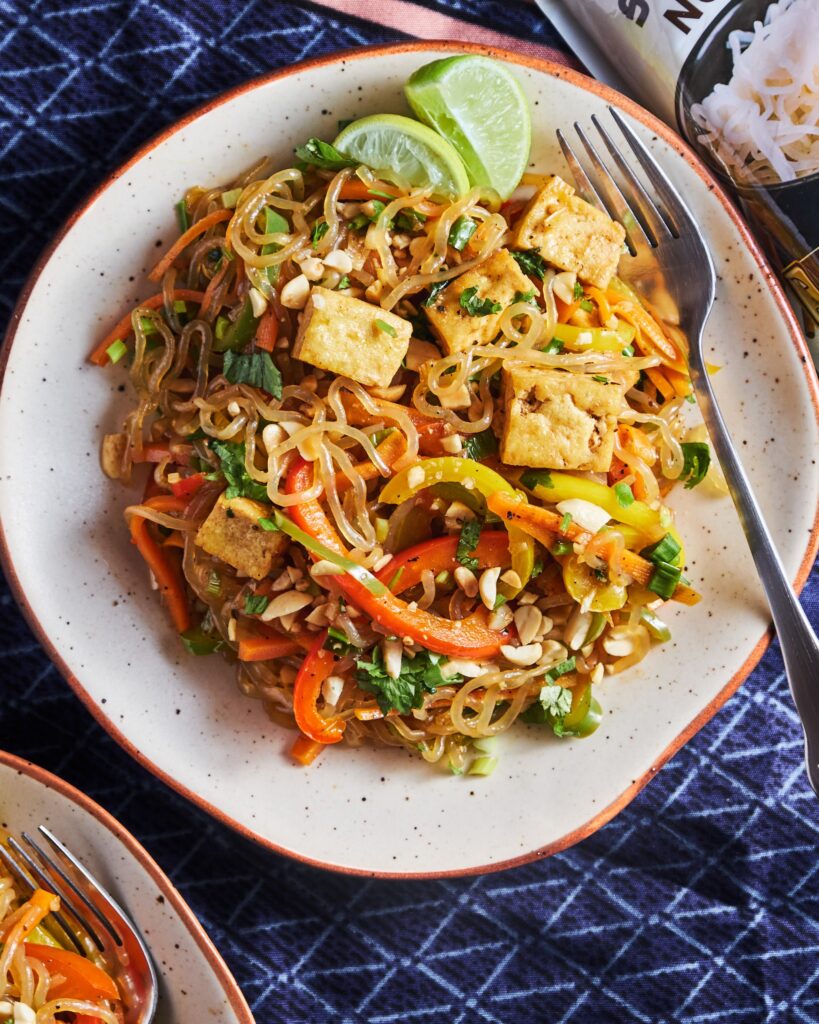
Sponsored By

This is an unsponsored, ad-free recipe. If you’d like to support my work, please consider:
Thank you! 💜 😊
Shirataki Pad Thai is a vegan-friendly, low-carb adaptation of the popular Thai dish. It uses shirataki noodles, which are derived from the konjac yam, making it an excellent choice for those following a gluten-free diet. The recipe preserves the classic Pad Thai balance of tangy, savory, and nutty flavors while offering a lighter alternative that’s easy to prepare and customize to suit various dietary needs.
Shirataki noodles are the centerpiece of this recipe. These translucent, low-calorie noodles are known for their ability to absorb the flavors of the ingredients they’re cooked with. Before use, they require a thorough rinse to remove their natural odor. Combined with a tamarind-based dressing made from coconut aminos, chili oil, and sesame oil, the noodles take on a bold, tangy flavor that serves as the backbone of the dish.
The recipe also includes firm tofu and an array of colorful vegetables, such as bell peppers, carrots, and onions. The tofu is stir-fried until golden, providing a protein-rich element that makes the dish hearty and satisfying. Meanwhile, the vegetables add crunch, freshness, and visual appeal, creating a well-rounded meal that’s as enjoyable to eat as it is nutritious.
A garnish of toasted peanuts, fresh cilantro, and lime wedges enhances the dish with additional layers of flavor and texture. The peanuts contribute a nutty crunch, the cilantro adds herbal brightness, and the lime provides a zesty tang that ties everything together. These simple yet effective toppings elevate the Pad Thai, making it feel complete and balanced.
Overall, this recipe offers a quick, straightforward way to enjoy a lighter version of Pad Thai at home. It’s ideal for weeknight dinners or meal prep, as it requires minimal cooking time and uses readily available ingredients. The recipe is also highly adaptable, allowing you to swap or adjust ingredients to suit your preferences or what you have on hand.
For the Dressing:
For the Pad Thai:
Step A: Prepare the dressing
Step B : Prepare main dish
Yes, rice noodles or zucchini noodles are great alternatives.
It removes the natural odor and improves the flavor absorption.
Absolutely, omit the peanuts or use a nut-free alternative like sunflower seeds.
Tamarind paste gives the dish its signature tang, but lime juice with a touch of sugar can work as a substitute.
Add more chili oil or top with fresh chili slices.
Yes, broccoli, snap peas, or mushrooms can be added for variety.
Yes, but it’s best to store the dressing and garnishes separately to retain freshness.
Firm tofu is ideal as it holds its shape during cooking.
Yes, use a non-stick pan and steam the vegetables instead of stir-frying.
Keep in an airtight container in the fridge for up to 2 days.
Yes, increase the coconut sugar or use a sweetener like maple syrup.
Reduce the chili oil for a milder flavor that kids might enjoy.
Try these delicious ideas:
Great0%
Good0%
Decent0%
Bad0%
Terrible0%
No similar recipes found.
Stay tuned.
Subscribe to my newsletter
One newsletter a week. No spam.
This form is protected by reCAPTCHA.
Google Privacy Policy and Terms of Service apply.